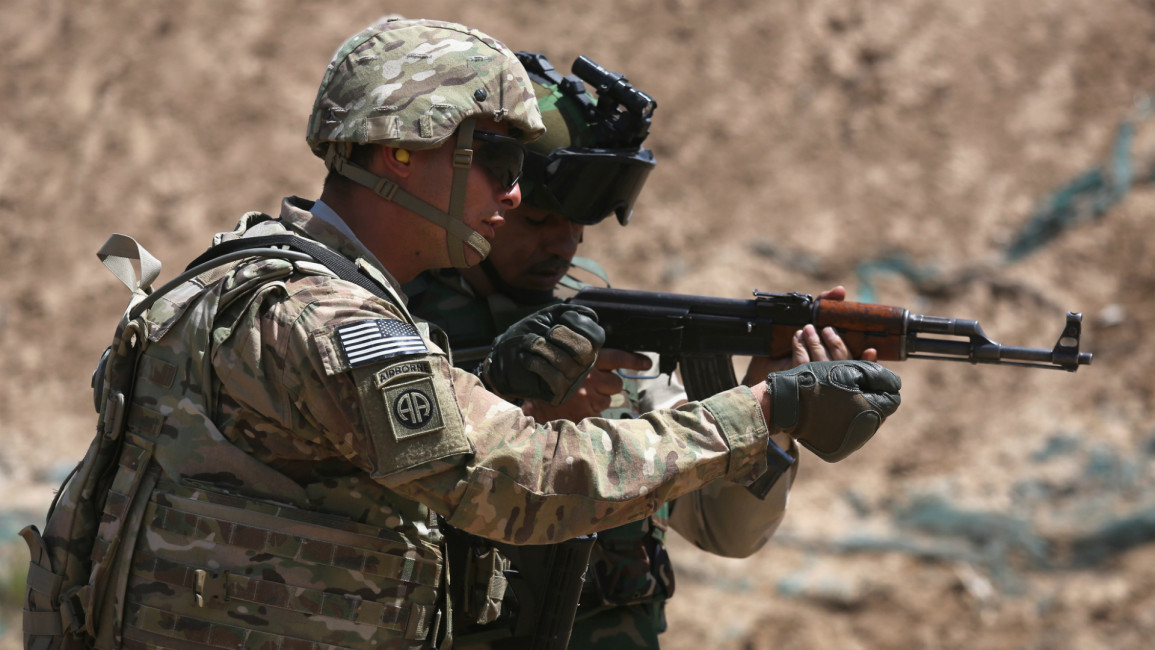Fight against IS dominates US-Iraq White House talks
Abadi, who is leading a delegation of senior ministers which arrived in Washington on Monday, is expected to meet Obama late Tuesday morning local time.
| We are fighting two battles and we need support - Iraqi PM Haider al-Abadi |
Iraqi government forces backed by Shia militias have made gains against IS in recent weeks, pushing the group out of Saddam Hussein's hometown Tikrit.
A Pentagon official told reporters on Monday that the group has lost control of up to 6,500 square miles (16,800 sq kilometres) in Iraq but have gained a bit of ground in Syria since last August.
But IS has regrouped since its ouster from Tikrit, strengthening its positions in Ninevah and the vast western province of Anbar.
"IS has recently moved 800 of its fiercest fighters from Syria to Anbar to support its operations there," a resident of Anbar, who asked not to be named, told al-Araby Al-Jadeed.
"The fighters are armed with modern weapons and equipment, they are highly experienced in street fighting and they were able to open new fronts in the province which were are clear setback to [government] forces."
Abadi says more international assistance is necessary to defeat the group. He has appealed for more airstrikes, weapons deliveries and training to help Iraqi forces.
"We are fighting two fundamental battles to cleanse Anbar and Mosul, and we need support," Abadi said in a Facebook post on Monday.
"We have won great victories, and the international coalition has made progress in supporting the Iraqi forces, and we ask the international community to offer more support and to take strong measures to stop terrorists travelling to Iraq."
Since IS took over the city of Mosul last year, foreign governments have carried out coordinated airstrikes to help the Iraqi government fight back, as well as arming forces loyal to Baghdad with mine-resistant vehicles, body armour, rifles, Hellfire missiles and ammunition.
Reuters reported on Monday that Iraq hopes to take first deliveries of its F-16 fighter jets from the United States this summer.
Australia's government said Tuesday it had completed preparations to send about 300 additional troops to Iraq to train Iraqi forces to fight IS.
Australia already has 170 special forces troops in Baghdad advising and assisting Iraqi security forces. Another 400 Australian air force personnel are supporting air strikes against Islamic State targets from a base outside Dubai.
America has signalled that more aid could be coming. Last week, Vice President Joe Biden touted momentum in the fight against the Islamic State group, and White House press secretary Josh Earnest said Monday, "If there are specific ideas that Prime Minister Abadi has for stepped-up assistance, then we'll obviously consider them seriously."
But Washington officials remain concerned about the role of the Popular Mobilisation militia, which has been accused of abuses against Sunni residents following the battle for Tikrit.
After years of war, the United States withdrew its forces from Iraq in 2011 but left behind troops to guard the US Embassy.
In November, Obama authorised the deployment of up to 1,500 more American troops to bolster Iraqi forces, which could more than double the total number of US forces to 3,100.
The Pentagon has made a spending request to Congress of $1.6 billion, focusing on training and arming Iraqi and Kurdish forces.
The US and its coalition allies have carried out nearly 2,000 strikes in Iraq since the campaign against the Islamic State began in August, as well as nearly 1,400 in neighbouring Syria.
American officials say that while the campaign has made gains, it is likely to stretch on for years.
The Islamic State group and other Sunni extremists carry out near-daily attacks targeting Iraq's security forces and Shia majority.
Car bombs went off Tuesday morning in and around the Iraqi capital, killing at least 11 civilians, officials said.
Seven people were killed when an explosives-laden car was detonated in a commercial area in the town of Mahmoudiyah, about 30 kilometres (20 miles) south of Baghdad, a police officer said.
The car was parked in a mainly Shia section of town near a bakery and went off as people were standing in line to buy bread.
With additional reporting from Associated Press



